
Food Security
Scope & Guideline
Leading the Charge in Food Security Research
Introduction
Aims and Scopes
- Interdisciplinary Research on Food Security:
The journal publishes studies that draw from various fields, including agriculture, nutrition, economics, and environmental science, to provide comprehensive insights into food security challenges. - Focus on Smallholder Farmers:
A significant portion of the research centers on the challenges faced by smallholder farmers, exploring their livelihoods, agricultural practices, and the socio-economic factors influencing their food security. - Impact of Climate Change:
Research investigating the effects of climate change on food production, food security, and adaptive strategies is prominently featured, highlighting the urgency of addressing climate-related risks. - Nutrition-Sensitive Agriculture:
The journal emphasizes the importance of nutrition-sensitive agricultural practices, investigating how agricultural interventions can improve dietary quality and health outcomes. - Policy and Governance Analysis:
Studies assessing the effectiveness of policies and governance structures in enhancing food security at local, national, and global levels are a core focus, providing actionable insights for stakeholders. - Socio-Economic Dynamics:
Research examining the socio-economic factors influencing food access, equity, and community resilience is regularly published, reflecting the journal’s commitment to understanding food security in diverse contexts.
Trending and Emerging
- Resilience and Adaptation Strategies:
There is an increasing focus on resilience-building and adaptation strategies for communities facing food insecurity, particularly in the context of climate change and economic shocks. - Nutrition and Health Outcomes:
Research linking food security with health outcomes, particularly in vulnerable populations, is gaining traction, highlighting the importance of dietary diversity and nutritional quality. - Impact of COVID-19 on Food Systems:
The journal has seen a surge in studies analyzing the effects of the COVID-19 pandemic on food security, including disruptions in supply chains, changes in consumer behavior, and impacts on vulnerable populations. - Digital Technologies in Agriculture:
Emerging themes include the role of digital technologies and innovations in enhancing agricultural productivity and food security, particularly in the context of smallholder farming. - Gender Dynamics in Food Systems:
There is a growing emphasis on understanding the role of gender in food security, exploring how gender dynamics affect access to resources, decision-making, and nutrition outcomes. - Food Sovereignty and Local Food Systems:
Research exploring food sovereignty movements and the development of local food systems is trending, reflecting a shift towards sustainable and community-led food security solutions.
Declining or Waning
- Traditional Agricultural Practices:
Research focused solely on traditional agricultural practices without integration of modern techniques or climate-smart approaches has decreased, as there is a growing emphasis on innovation and adaptation. - Food Security in High-Income Countries:
There has been a noticeable reduction in studies addressing food security issues specific to high-income countries, as the journal increasingly prioritizes challenges faced in low- and middle-income contexts. - Single-Factor Analyses:
Papers that analyze food security through a single-factor lens (e.g., only agricultural productivity) have waned, reflecting a shift towards more holistic, multi-dimensional analyses. - Food Security and Trade Relations:
Research specifically focused on trade relations and their implications for food security has become less frequent, possibly overshadowed by more pressing issues such as climate change and nutrition. - Urban Food Security in Isolation:
Studies addressing urban food security without considering broader rural-urban linkages and the interconnectedness of food systems have declined, as there is a growing recognition of the need for integrated approaches.
Similar Journals
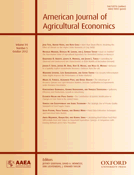
AMERICAN JOURNAL OF AGRICULTURAL ECONOMICS
Shaping Policies Through Rigorous Economic AnalysisThe American Journal of Agricultural Economics, published by Wiley, stands as a premier peer-reviewed journal in the fields of Agricultural and Biological Sciences and Economics and Econometrics. Established in 1919, this esteemed journal has a history of contributing significant research and insights that shape agricultural policies and economic frameworks. With an impressive Q1 ranking in both stated categories and maintaining a notable standing in the Scopus rankings—Rank #7 out of 193 in Agricultural and Biological Sciences and Rank #71 out of 716 in Economics—this journal is recognized for its high-quality scholarship and impactful research findings. Researchers, professionals, and students alike will find a wealth of knowledge within its pages, addressing critical issues in agricultural economics and providing cutting-edge analyses that inform both theory and practice. Stay ahead of the curve in this dynamic field by engaging with the American Journal of Agricultural Economics, where future trends and innovative solutions meet scholarly excellence, enriching our understanding of the agricultural economy.

Studies in Agricultural Economics
Advancing Knowledge in Agricultural EconomicsStudies in Agricultural Economics is a premier journal published by AGRARGAZDASAGI KUTATO & INFORMATIKAI INTEZET in Hungary, focusing on innovative research in the interdisciplinary fields of agricultural, biological, and economic sciences. Since becoming an Open Access journal in 1997, it has aimed to enhance the visibility of agricultural economics scholarship while promoting global engagement among researchers, practitioners, and policymakers. With its robust Q2 and Q3 rankings across varied categories including Development and Geography, this journal serves as a significant platform for disseminating cutting-edge studies that address crucial issues in agriculture and rural development. The journal's continuous publication since 2011 until 2024 exemplifies its commitment to providing timely insights into evolving agricultural challenges. With a strong Scopus ranking across multiple domains, particularly in the social sciences and agricultural sectors, it stands as a vital resource for anyone looking to advance knowledge and practice in these critical areas.

Economia Agraria y Recursos Naturales
Empowering Voices in the Quest for Environmental SolutionsEconomia Agraria y Recursos Naturales, published by UNIV POLITECNICA VALENCIA, EDITORIAL UPV, is a prominent open-access journal that has been serving the fields of agricultural and biological sciences, environmental science, and geography since 2001. With an ISSN of 1578-0732 and an E-ISSN of 2174-7350, this journal is dedicated to publishing high-quality research that contributes to the sustainable management of natural resources and agricultural practices. The journal invites scholars, practitioners, and students to explore and share innovative findings that address pressing environmental challenges. While currently categorized in the lower quartiles (Q4) for various disciplines in 2023, its open-access model ensures wide dissemination and visibility for authors and their work, aligning with the growing trend towards accessibility in academic publishing. Positioned in Spain, Economia Agraria y Recursos Naturales is a valuable resource for those seeking to engage with the intersection of agriculture, environmental studies, and policy planning within a global context.

Asian Journal of Agriculture and Development
Fostering interdisciplinary insights for agricultural progress.Asian Journal of Agriculture and Development is a prestigious academic journal dedicated to advancing the field of agricultural research and development within the context of Southeast Asia. Published by the Southeast Asian Regional Center for Graduate Study and Research in Agriculture, this journal plays a vital role in disseminating innovative findings and best practices critical for sustainable agricultural development in the region. With a focus on interdisciplinary studies that integrate agricultural science, policy development, and socio-economic factors, the journal invites researchers, professionals, and students to contribute rigorous research that addresses contemporary challenges faced by the agriculture sector. Although it operates within a non-open access framework, the journal aims to ensure wide visibility and accessibility of its publications through strategic collaborations and institutional partnerships. By engaging with its content, stakeholders can gain valuable insights and foster meaningful dialogue that drives forward agricultural progress in Asia.

Revista Espanola de Estudios Agrosociales y Pesqueros-REEAP
Advancing the Dialogue in Agriculture and FisheriesRevista Espanola de Estudios Agrosociales y Pesqueros (REEAP) is a prominent academic journal dedicated to advancing knowledge in the fields of agricultural, social, and fisheries studies. Published by the esteemed Ministerio Agricultura Pesca & Alimentacion, Secretaria General Tecnica, this journal provides a critical platform for researchers, professionals, and students to disseminate their findings and insights. Although specific impact metrics are not available, REEAP is recognized for its commitment to high-quality research, focusing on contemporary issues that affect rural and fishing communities in Spain and beyond. The journal encourages open scholarly dialogue and exploration of sustainable practices, policy implications, and socio-economic factors influencing agriculture and fisheries. With its strategic location in Madrid, the journal aims to foster interdisciplinary collaboration and engage a diverse readership interested in the complex interplay between agriculture, social dynamics, and environmental stewardship.
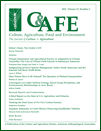
Culture Agriculture Food and Environment
Advancing Knowledge at the Nexus of Food and EnvironmentCulture Agriculture Food and Environment, published by WILEY, is an esteemed journal that serves as a pivotal platform for interdisciplinary research at the intersection of cultural studies, anthropology, and agricultural sciences. With its ISSN 2153-9553 and E-ISSN 2153-9561, this journal aims to foster scholarly dialogue on the complex relationships between food, culture, and environmental sustainability. As of 2023, it proudly holds a Q2 ranking in Agricultural and Biological Sciences and Anthropology, as well as a Q1 ranking in Cultural Studies, indicating its significant impact within these disciplines. Researchers and professionals will appreciate its rigorous peer-review process and diverse coverage, which extends from 2011 to 2024, reflecting ongoing debates and innovations in the field. Although open access options are not provided, the journal's commitment to advancing knowledge in understanding food systems and cultural practices makes it a vital resource for academics and practitioners alike, promoting a deeper understanding of the cultural dimensions of agriculture and the environment.
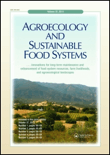
Agroecology and Sustainable Food Systems
Connecting research and practice for a greener tomorrow.Agroecology and Sustainable Food Systems, published by Taylor & Francis Inc, is a premier academic journal dedicated to advancing the science of agroecology and its applications in sustainable food systems. With an impact factor that reflects its significant influence in the field, this journal serves as a vital resource for researchers, industry professionals, and students engaged in sustainability, agriculture, and environmental studies. As of 2023, it proudly holds a Q1 ranking in Agronomy and Crop Science, as well as Q2 rankings in Development and Renewable Energy, Sustainability, and the Environment categories. Covering a broad spectrum of topics, it not only shares peer-reviewed research but also encourages discourse on innovative practices and policies that enhance food security and ecological balance. Available for access through various options including Open Access, the journal's commitment to knowledge dissemination is further underscored by its substantial rankings on Scopus, with notable percentiles across multiple disciplines. By focusing on agroecological principles and their socio-economic implications, Agroecology and Sustainable Food Systems is essential for those looking to stimulate meaningful change in agricultural practices and sustainability initiatives worldwide.
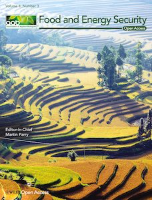
Food and Energy Security
Innovating the Future of Food Systems and Renewable EnergyFood and Energy Security, an esteemed journal published by WILEY, is dedicated to advancing the fields of food science, agriculture, and renewable energy. Since its inception in 2012, this open-access journal has provided a platform for groundbreaking research and innovative practices that address global challenges related to food production and energy sustainability. With an impressive impact factor reflected in its Q1 quartile rankings across notable categories such as Agronomy and Crop Science and Food Science, this journal is instrumental for researchers and practitioners alike who are focused on enhancing food security and promoting sustainable energy solutions. The journal's scope encompasses multidisciplinary approaches and encourages submissions that explore the intersection of food systems and energy dynamics, ensuring relevance in the evolving landscape of environmental science and policy. By offering open access to its publications, Food and Energy Security commits to making vital research accessible, fostering informed dialogue and collaboration among scholars, policymakers, and the agrifood industry worldwide.
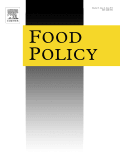
FOOD POLICY
Catalyzing change in food-related governance and practices.FOOD POLICY, published by Elsevier Science Ltd, is a premier journal in the fields of Development, Economics, Food Science, and Policy studies, with a distinct focus on the intersection of food systems and policy frameworks. With an impact factor that places it in the Q1 category across five key disciplines in 2023, this journal is recognized for its rigorous research and influential contributions to the understanding of food-related governance and socio-economic dynamics. Its strong Scopus rankings, including a startling 25th position in Sociology and Political Science and 10th in Development, emphasize its critical role in shaping contemporary discourse around food security, agricultural policies, and sustainable practices. Although it operates under a traditional access model, FOOD POLICY remains an essential resource for researchers, practitioners, and students seeking to explore innovative policy solutions and their socio-economic implications. With a rich publication history stretching from 1975 to 2024, this journal strives to influence both academic thought and real-world practices in food policy.
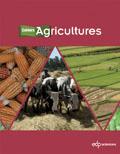
CAHIERS AGRICULTURES
Elevating agricultural science for global impact.CAHIERS AGRICULTURES is a distinguished open-access journal published by EDP Sciences S A, focusing on the vital fields of Agronomy and Crop Science, Animal Science and Zoology, as well as Management, Monitoring, Policy, and Law. With an ISSN of 1166-7699 and an E-ISSN of 1777-5949, this journal has notably maintained a strong presence in the academic landscape since its establishment, covering a wide range of topics pertinent to agricultural sciences. Based in France, CAHIERS AGRICULTURES fosters collaboration and knowledge sharing among researchers and practitioners through its open-access model, which has been in effect since 2014. The journal is recognized for its rigorous peer-review process, reflected in its competitive Scopus rankings, which place it in the Q2 quartile for both Agronomy and Crop Science, and Animal Science and Zoology. Researchers and scholars are encouraged to contribute cutting-edge findings that may influence agricultural practices and policy development. With a vision to advance sustainable agricultural practices, CAHIERS AGRICULTURES stands as a critical resource for advancing scientific knowledge and informing stakeholders in the agricultural sector.